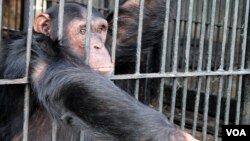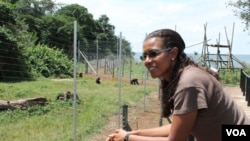KAMPALA —
Ebola threat
Uganda's recent flood of Congolese refugees is having unexpected side-effects: some Ugandans are adopting the Congolese custom of eating primates, a new trend that may be linked to outbreaks of Ebola and represents a potential threat to the country's endangered chimpanzee population.
For some conservationists, protecting an animal that shares almost 99 percent of its DNA with humans is a deeply personal issue.
“In terms of relationship, you could have one who is really your close friend, while others tend to not bother so much," says Amos Okello, a caregiver at Lake Victoria's Ngamba Island Chimpanzee Sanctuary, who feeds an eager bunch of the highly intelligent creatures each morning.
According to sanctuary director Lily Ajarova, while primate consumption is not unusual in Africa, Uganda has no history of the practice. Although her team has yet to find Ugandans eating chimpanzees in particular, they fear that Ugandans who are known eat various primates may soon go the way of their chimp-eating neighbors to the west.
"It’s an emerging issue that we are very keen to dig into right now," she says, explaining that hunters already pose the biggest threat to the continent's primate population. “We have encountered local Ugandans actually hunting primates and being in possession of them, and saying ... that ‘Yes, we are going to eat them.’
“The fear is that if they can eat a baboon, if they can eat a black-and-white colobus monkey, what would be the difference with eating a chimp?" she says. "In the case of chimpanzees, they are endangered, so they will actually go extinct from the face of the Earth if they are just eaten like that.”
Rising food prices
The timing of the trend is not coincidence. Over the past year alone, tens of thousands of Congolese refugees have streamed over Uganda’s western border, fleeing civil war in the Democratic Republic of Congo, expanding the already large number of fellow refugees that arrived in previous years.
According to Daniel Molla of the United Nations World Food Program, although most of the refugees live in organized settlements and buy food at local markets, reduced aid rations have increased demand for food, putting pressure on local communities.
“They do compete," he says of the marketplace consumers. "They do also go to the same markets to purchase food, so if you have host communities — poor households who have to rely on purchasing from the market — they would be facing possibly higher prices in the presence of a large refugee population.”
While rising food prices help to explain why Ugandans are seeking new sources of bush meat, health professionals continue to grapple with potential dangers of its widespread consumption.
Ebola threat
Primates can carry Ebola, a virus that triggers a deadly hemorrhagic fever. Uganda saw three outbreaks of the disease in the last year alone.
According to Dr. Monday Busuulwa of the African Field Epidemiology Network, handling the animals can be very risky.
“In the 2007 Bundibugyo outbreak, they confirmed to us that they eat these primates," says the epidemiologist. "People who have slaughtered sick chimpanzees or gorillas which are infected with Ebola, they have ended up getting infected with Ebola. There is a very high likelihood that communities where people eat these non-human primates — the monkeys, the chimpanzees — are likely to get Ebola.”
This fact, Busuulwa adds, may explain why most of Uganda’s recent Ebola outbreaks have occurred in the west, where the concentration of Congolese refugees is the highest.
"These communities have this history of eating non-human primates," he says, explaining that it not only exposes them to infection, but that symptoms are exacerbated by circumstances. "It’s possible that this civil unrest can also help in aggravating these outbreaks."
Loss of values
While environmental groups are trying to fight the trend by teaching people about conservation and the dangers of eating primates, sanctuary director Ajarova emphasizes the value of traditional Ugandan culture, in which primates are protected as totem animals, or animals representing a clan.
“This culture has been of great value for conservation, but I also feel we are at a point where, in Uganda, the current generation thinks that the Western culture is better, so we are losing our own culture," she says. "With that comes the loss of these values we had for conservation.”
The World Food Program warns that with more and more refugees arriving from Congo every day, food insecurity in western Uganda is likely to get worse, which is bad news for chimps and the humans who hunt them.


